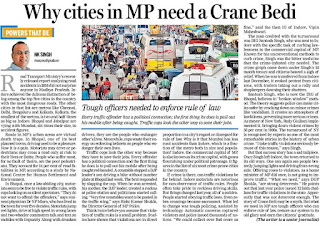Roads in MP towns are death traps
NK SINGH
Road Transport Ministry’s recently
released report analysing road accidents in 2016 did not surprise anyone in Madhya
Pradesh. Indore achieved the dubious distinction of being among the top five
cities in the country with most dangerous roads. The other cities in that list
are metros like Chennai, Delhi, Bengaluru and Kolkata. Kolkata, the smallest of
the metros, is two and half times as big as Indore. Bhopal and Jabalpur are
vying with Mumbai, six times their size, in accident figures.
Roads in MP’s urban areas are virtual
death traps. In Bhopal, one of its best planned towns, driving used to be a
pleasure. Now it is a pain. Motorists may drive or pedestrians may cross a road
only at risk to their lives or limbs. People who suffer most, for no fault of theirs, are the poor
pedestrians. They account for 14 per cent of road fatalities in MP, according
to a study by National Centre for Human Settlement and Environment.
In Bhopal, once a law-abiding city, motorists
seem to be free to violate traffic rules, with cops looking on as silent
spectators. “They do not want to offend the offenders,” says eminent physician
Dr NP Misra, who has lived in the town for over five decades. Motorists jump
red lights, drive at speed in wrong lanes and two-wheeler drivers talk and text
on mobiles with impunity. Along with drunken drivers, they are the people who endanger
other’s lives. The cops waste their energy on enforcing helmets – people who
endanger their own lives.
Traffic cop looks the other way because
he has to save his job. Every offender has a political connection and the first
thing he does is to pull out his mobile after being caught red-handed. A
constable stopped a BJP leader’s son driving a bike without number plate at
Bhopal last week. The brat responded by slapping the cop. When he was arrested,
his mother, the BJP leader, created a ruckus at police station. Politicians
started calling. “Very few constables want to be posted in the traffic wing,”
says Rishi Kumar Shukla, the Director General of MP Police.
Think twice before you assume that violation
of traffic rules is a small problem. Studies have shown that it is in direct proportion
to a city’s regard or disregard for rule of law. Why is it that Mumbai has less
road accidents than Indore, which is a fraction of the metro both in size and population?
Indore, the commercial capital of MP, is also known as its crime capital, with
goons flourishing under political patronage. It figures in the list of six most
crime-prone cities in the country.
If crime is there, can traffic
violations be far behind. Indore motorists are notorious for non-observance of
traffic rules. People often take pride in reckless driving skills. But things
changed last year, all of a sudden. People started obeying traffic laws. Even zebra
crossings became sacrosanct. What led to change was tough policing, assisted by
technology. Automatic cameras captured violators and police issued thousands of
notices. “We could collect over Rs six crore as fine,” said the then IG of
Indore, Vipin Maheshwari.
The man credited with the turnaround
was DIG Santosh Singh, who was sent to Indore with the specific task of curbing
lawlessness in the commercial capital of MP. Known for his unconventional methods to curb
crime, Singh was the bitter medicine that the crime-infested city needed. Crime
graph came down under Singh’s 18 month tenure and citizens heaved a sigh of
relief. When he was transferred from Indore last December, it evoked protest
from citizens, with traders taking out a rally and shopkeepers downing their
shutters.
Santosh Singh, who is
now the DIG of Bhopal, believes in “broken
window” method. The theory suggests police can make cities safer by cracking
down on minor crimes like vandalism. It creates an atmosphere of lawfulness, preventing more serious crimes. As
Mayor of New York, Rudy Giuliani implemented it, bringing down violent crimes
by 56 per cent in 1990s. The turnaround of NY is recognised by experts as one of the most remarkable
stories in the history of urban crime. “I take traffic violations seriously
because of this reason,” says Singh.
But that success
story has a sad tailpiece. Once Singh left Indore, the town returned to its old
ways. One can again see people brazenly jumping lights and driving from wrong
side. Offering roses to violators, as a home minister of MP did once, is not
going to improve traffic. “What we need,” says DGP Shukla, “are strong
deterrents.” He points out that last year police issued 12 lakh challans for
traffic violations in the State. Apparently that was not deterrent enough. The
story of Crane Bedi may be a myth. But what we need in MP are tough officers
who can enforce rule of law, restore our system to its old glory and earn the
citizens’ gratitude.
My Column POWERS THAT BE in DB POST of 25 Sept 2017
Email: nksexpress@gmail.com. Tweets @nksepxress


Comments
Post a Comment
Thanks for your comment. It will be published shortly by the Editor.